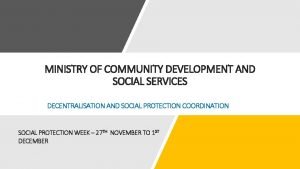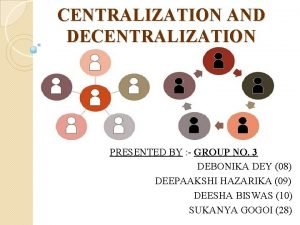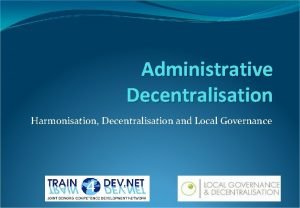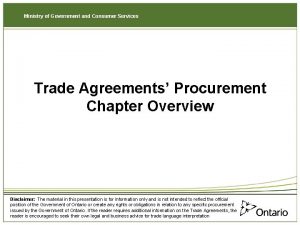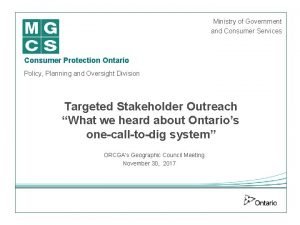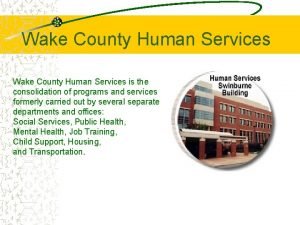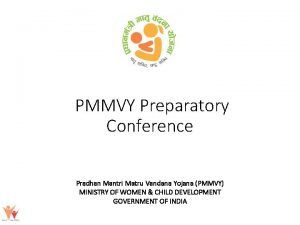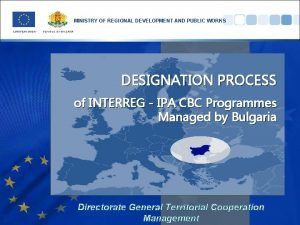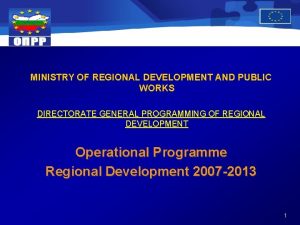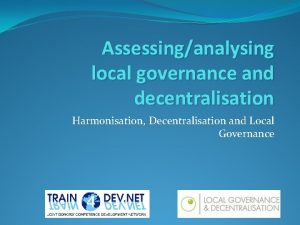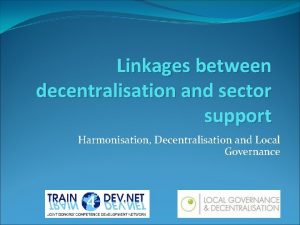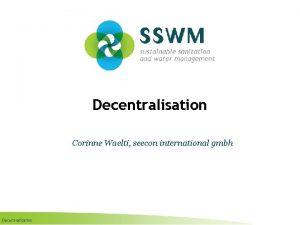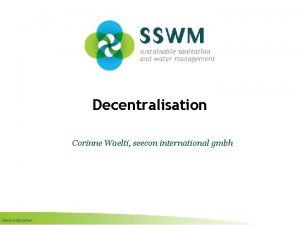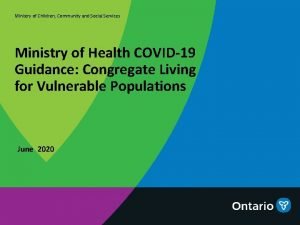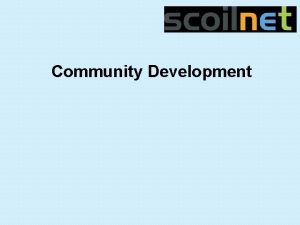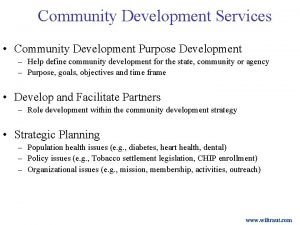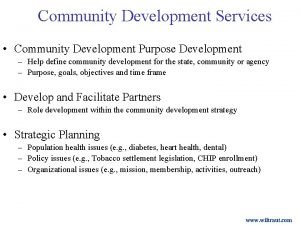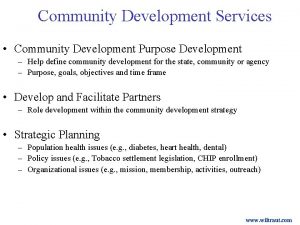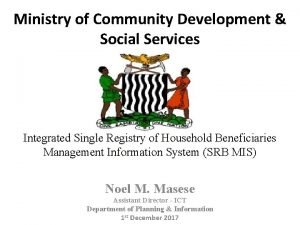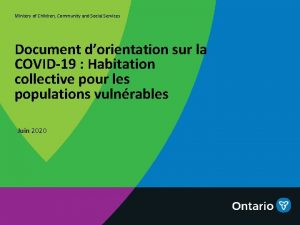MINISTRY OF COMMUNITY DEVELOPMENT AND SOCIAL SERVICES DECENTRALISATION















- Slides: 15

MINISTRY OF COMMUNITY DEVELOPMENT AND SOCIAL SERVICES DECENTRALISATION AND SOCIAL PROTECTION COORDINATION SOCIAL PROTECTION WEEK – 27 TH NOVEMBER TO 1 ST DECEMBER

Presentation outline • Definition of Coordination • Background to Social Protection Coordination • Coordination in the context of decentralisation • Single Registry of Beneficiaries • Single Window • Integrated Framework for Basic Social Protection • Conclusion

Introduction • Government with support from its cooperating partners and the UN Agencies have been searching for a number of initiatives in order to improve coordination and to assist in resolving some of the coordination challenges faced in the social protection sector; • Some of the initiatives in the context of decentralization that have been explored are discussed in this presentation

Contextual Background § The Ministry of Community Development and Social Services is one of the First Five Ministries whose functions are to be devolved; § Most of the Ministerial Programmes are implemented through the structures that run from the Centre to the sub-centre districts and through the voluntary community committees; § The Ministry’s participation in the decentralization process from way back as 2002 following the formulation of the decentralization policy and its launch in 2004; § The Ministry formulated the submitted the sector plans in line with its mandate and in line with the Government’s aspirations; § The Sector Devolution Action Plan considered the allocation and utilisation of resources from the centre to the periphery at district and sub-district levels for efficient and cost effective delivery of programmes;

Functions to be devolved • There are two Departments within the Ministry whose functions are earmarked to be devolved; • Department of Social Welfare; • Statutory and Non-Statutory • Department of Community Development;

Specific functions devolved – Department of Social Welfare Statutory Provision of Probation services; Provision of Child welfare services; Supervision and inspection of child care facilities; Protection of children in need of care Facilitation of Child Adoption and Foster Care services; Care of and support to Juveniles in correctional institutions; • Investigations and disposal of juvenile delinquent cases. • Provision of services to victims of GBV and Human Trafficking • • • Non Statutory • Providing in kind support through Public Welfare Assistance Scheme • Providing financial support to incapacitated households and vulnerable individuals through Social Cash Transfers • Providing grants to vulnerable individuals for income generating activities through Social Protection Fund • Establishing and maintaining home tie-up contacts with prisoners; • Carrying out casework for prisoners and circumstantial children

Department of Community Development- functions to be devolved § Identification and implementation of community development projects and programmes; § Facilitation of Women Development programmes; § Facilitation of Functional Literacy and Survival Skills Development; § Development and implementation of Food Security Pack (FSP) Programme; and § Community Self-Help Initiatives.

Definition Coordination • The alignment and harmonization of all stakeholder activities at programme and admin levels in a holistic manner. • Coordination is a continuum that range from loose arrangements (share infor) to more complex relationships ( plan and share resources) Paddling in different directions

CORDINATION IN THE CONTEXT OF DECENTRALISATION NETWORKING CORDINATING COPERATING COLABORATING INTEGRATING Exchange of Exchange of of information information Informal Formal Relationship Relationship p No sharing resources Minimal sharing of resources Sharing resources for common purpose Sharing Merging of resources to resources enhance capacity of another.

Lessons from the 2017 Joint Annual Review indicated that in some districts there is some local levelnetworking • Share information, planning and resources

The 2017 Joint Annual Review • Sharing information; further indicated that • Formal relationship there is attending council Sharing of Meetings; resources for • Share material resources common Vehicles? purpose

INTERGRATED FRAMEWORK OF BASIC SOCIAL PROTECTION PROGRAMMES (IFBSPP) • The framework is meant to improve coordination and reduce fragmentation and optimize funding allocations of non-contributory to social protection; • The framework aims at providing clear definition of programmes that will be expanded, phased out, integrated or merged and recommends new programmes that maybe added. The purpose of this framework is to develop a blueprint that will give explicit detail on: a) the operationalization of the National Social Protection Policy (NSPP); b) Improve coordination and reduce the fragmentation of social support programmes across national counterparts; c) Inform key linkages within social protection programmes; d) Ensure that programme delivery is anchored on a coherent interlinked system at policy, administrative and implementation levels; as well as e) optimize the allocations for social protection interventions.

SINGLE WINDOW/REFERRAL SYSTEM • The Single Window or Single Referral System is a one-stop shop hosted in decentralized government structures that aims to distribute social services and transfers close to the people, empower local communities and the subnational administration in the delivery of social services and transfers; • Increase access to information, transparency, and traceability through efficient management information systems and appeals mechanisms; • The referral systems is therefore a tool that could be used in addressing coordination at the first point of contact with beneficiaries from community level; • These systems will then feed into the higher level coordination mechanisms at district, provincial and subnational levels; • Through the provision of combined benefit packages, the SRS carries the potential to maximize the impact of these interventions on poverty reduction; • This system will aid in circumventing overlap of functions through reduction in duplication whilst reinforcing information exchange, enhanced outreach of existing programmes, strengthen reporting channels, better resource use support registration processes, facilitate access to benefits in cash or kind;

The objectives for the back office referral centres/ single window service centres • Facilitate exchange of information and coherence in programming across different social protection programs operating in the district, with a view at realising synergies • development of cross-departmental cross-programme implementation guidelines/plans/protocols • Facilitate common information management and M&E systems that will enable the monitoring of achievements, planning for the future, and evaluating impact of social protection programmes; • Build institutional capacities of local administrators

Conclusion – Coordination of Social Protection in a decentralized system is important as it will enhance service delivery in a coherent manner; and Single Referral System is a one-stop shop hosted in decentralized government structures will bring social protection services close to the people, empower local communities and the subnational administration
 Ministry of community development
Ministry of community development 1982 loi de décentralisation
1982 loi de décentralisation Action syndicale
Action syndicale Déconcentration et décentralisation différence
Déconcentration et décentralisation différence Centralization
Centralization Def décentralisation
Def décentralisation Decentralisation, diversification, connectivity, simplicity
Decentralisation, diversification, connectivity, simplicity Ministry of government and consumer services
Ministry of government and consumer services Ministry of government and consumer services
Ministry of government and consumer services Wake county human services community services center
Wake county human services community services center Ministry of agriculture and rural development cameroon
Ministry of agriculture and rural development cameroon Ministry of agriculture and rural development vietnam
Ministry of agriculture and rural development vietnam Ministry of women and child development logo
Ministry of women and child development logo Ministry of agriculture and livestock development nepal
Ministry of agriculture and livestock development nepal Ministry of regional development and public works
Ministry of regional development and public works Ministry of regional development and public works
Ministry of regional development and public works
